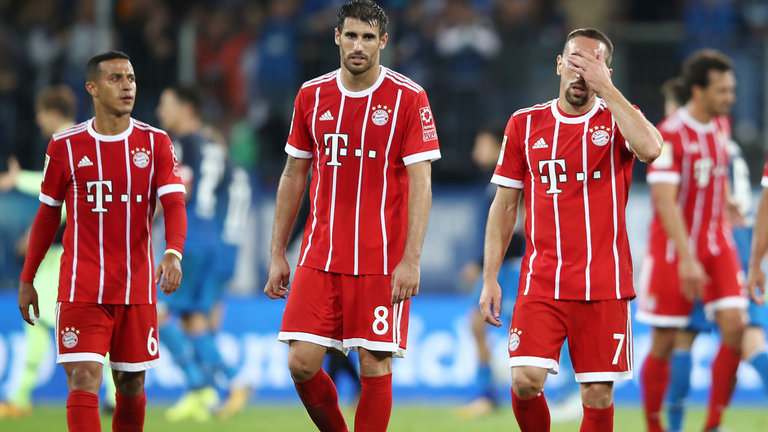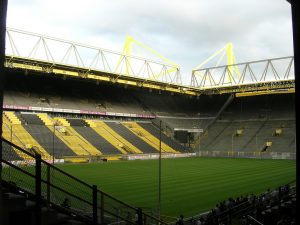The reign of Pep Guardiola is far in Bayern Munich’s rearview mirror these days. Their reality today is far from what they would’ve hoped for after his departure, a fact that became terribly apparent when the club sacked well-respected manager Carlo Ancelotti last week.
Ancelotti, who has managed some of the best sides in Europe for decades, was seen as more than up to the task of seeing Bayern through a transitory phase meant to bring an influx of youth talent to the club. Still, they were expected to maintain their elite form achieved under Guardiola in both Germany and Europe. Instead, results achieved under the Italian were middling by Bayern’s elite standards in Ancelotti’s first season. Bayern managed to stave off upstarts RB Leipzig to maintain their hold on the Bundesliga title but were bounced from the German domestic cup in the semi-finals and lost handily to Cristiano Ronaldo and Real Madrid in the quarter-finals of the Champions League. Bayern’s squad, made up of many long-serving stars, started showing signs of their age as the season progressed, and any questions of doubt about Ancelotti’s fit at the club were not put to rest as the Bavarians struggled for form in pre-season.
Still, president Uli Hoeness and Chairman Karl-Heinz Rummenigge, regarded as some of the shrewdest businessmen in Europe, did well to bring in some of Europe’s brightest talents in the summer transfer window to bolster the squad for the 2017-18 campaign. Without losing any of the club’s core players, Bayern brought in Hoffenheim duo Niklas Süle and Sebastian Rudy, Lyon starlet Corentin Tolisso, and Colombian superstar James Rodriguez on loan from Real Madrid. These signings were made in an effort to equip these players to take the reigns from Bayern’s veterans eventually.
Bayern will probably continue to be elite on the transfer market, but football is played on a pitch with 11 men, and Bayern’s efforts in that regard have been anything but convincing. With Ancelotti’s metaphorical hot seat already warm entering the season, a loss to 30-year-old prodigy manager Julian Nagelsmann’s Hoffenheim side put the manager a poor result or two away from seeing his time at Bayern come to an end. The club’s next result, a tough-to-swallow draw against Wolfsburg in the Bundesliga, a game in which Bayern squandered a two-goal second half lead, put the pressure on the gaffer to put out a strong side against Paris Saint-Germain in their midweek Champions League fixture. As it happened, Ancelotti left proven veterans Mats Hummels, Franck Ribery, and Arjen Robben on the bench for the clash, and Bayern were completely undone by Neymar, Kylian Mbappe, & Co. in a match that ended 3-0 to the Parisians. The Bayern board, never a group to twiddle its fingers, had Carlo packing his bags the next morning.
If Bayern were struggling before Ancelotti left, they were reeling when his assistant Willy Sagnol briefly took charge. In the Frenchman’s first game in charge, his squad suffered the same result they had the previous weekend against Wolfsburg, as they went two goals up against middling side Hertha Berlin before conceding twice in the span of five minutes, with the match ending 2-2. The gap between table-toppers Borussia Dortmund and Bayern is only growing, with Sagnol going so far as to say, “We are no longer the strongest team in Germany.” A damning statement considering Bayern have claimed the last five Bundesliga titles, that was just about the least inspiring thing any of Bayern’s players would like to be hearing from their skipper.
Everything at Bayern points to a full-fledged identity crisis at what German fans call “FC Hollywood,” a notion previously unthinkable given how expertly the club has been led in the last half decade. This is coming at a time when the Bundesliga is on shaky ground with regards to its standing as one of the world’s most competitive leagues, as German clubs have been struggling in European competitions this season, recently losing their priority ranking ahead of the Italian Serie A in the UEFA coefficient ranking, which determines how many Champions League and Europa League places are awarded to each league. With the club and the league lacking leadership, the question arises then, who will be the players, and the manager, to pull Bayern out of this period of instability?
Bayern’s squad is less the issue than the managerial situation. The club, and German teams in general, have always been restrained in their spending on players in transfer windows, and this gap is starting to show in matches such as the club’s embarrassment against PSG and even Borussia Dortmund’s loss to Tottenham Hotspur. Still, Bayern do some of the best business in the world, and are always snapping up premier talent at relatively bargain prices on the transfer market. Rodriguez and Tolisso are looking like quality signings already, and there are still a staggering number of world-class players left in Bayern’s squad, at every position on the pitch.
The question of who will be on the touchline for the Bavarians, in the short term at least, has been answered. Jupp Heynckes, manager of Bayern three times before, is returning to management for his fourth stint with the club. Heynckes has had great success at the club before, winning the Bundesliga three times and leading them to a Champions League victory in 2012-13. Many of the same faces are still around from Heynckes’ most recent stint with the club from 2011-13, so Heynckes’ appointment clearly has the support of some of Bayern’s veterans. Widely viewed as a safe appointment for the club in the short term, Heynckes will be counted on to produce results for Bayern until the end of this season before the club move for a big fish next summer.
The name most often linked with taking the job then, and with good reason, is that of the aforementioned Julian Nagelsmann. Nagelsmann, just 30 years old, is younger than some of Bayern’s stars such as Robben, Ribery, and Manuel Neuer. He has a short resume compared to Bayern’s other would-be options, but it is impossible to deny his successes while at Hoffenheim. Last season, in his first full campaign as manager, he navigated the club to a fourth-place finish in the league, an incredible result considering the resources at his disposal. This year Nagelsmann just missed out on qualifying for the group stages of the Champions League, as his side fell to Liverpool in the play-in round. Seen as a tactician wise beyond his years and a true friend to his players, it seems only a matter of time before Nagelsmann is managing either Bayern or the German national team. Given his rapid ascent, that time could happen sooner rather than later. While this aggressive move is contrary to Bayern’s consistent, conservative approach to managing all facets of their football club, they may deem Nagelsmann the right man to oversee their rebuilding project – that is, if a club of such immense talent can ever undertake one.






